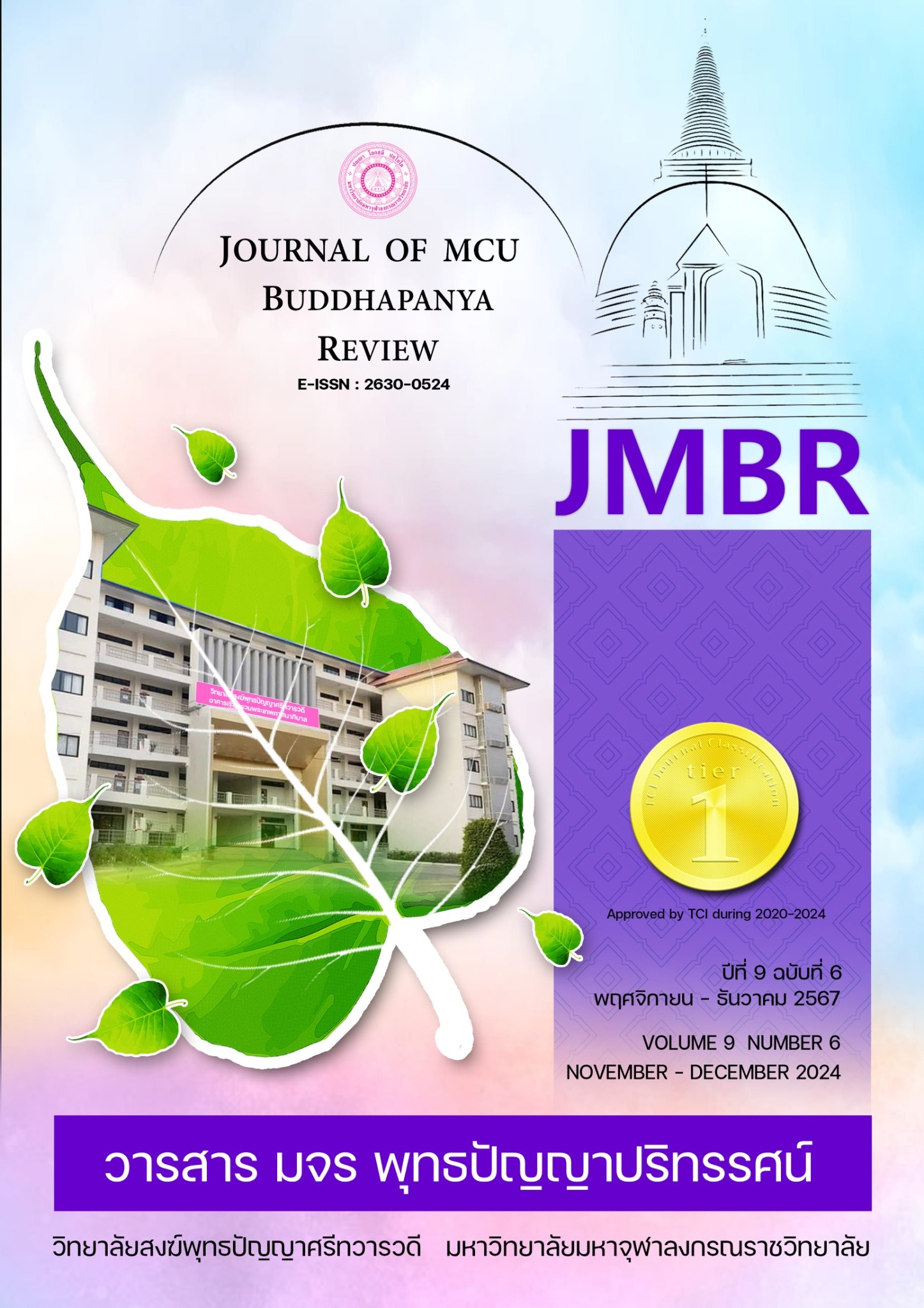รูปแบบการเรียนการสอนผสมผสานบนมูคที่ใช้โครงงานเป็นฐานภายใต้สภาพแวดล้อมแบบเกมมิฟิเคชันเพื่อส่งเสริมการรู้ดิจิทัลสำหรับนิสิตระดับปริญญาตรี: การวิจัยระยะที่ 1
คำสำคัญ:
การรู้ดิจิทัล, การเรียนการสอนผสมผสานบนมูค, การเรียนรู้โดยใช้โครงงานเป็นฐาน, สภาพแวดล้อมแบบเกมมิฟิเคชันบทคัดย่อ
บทความวิจัยนี้มีวัตถุประสงค์เพื่อ 1) พัฒนารูปแบบการเรียนการสอนผสมผสานบนมูคโดยใช้โครงงานเป็นฐานภายใต้สภาพแวดล้อมแบบเกมมิฟิเคชันเพื่อส่งเสริมการรู้ดิจิทัลสำหรับนิสิตระดับปริญญาตรี 2) ประเมินความเหมาะสมของรูปแบบการเรียนการสอนโดยศึกษาจากความคิดเห็นของผู้เชี่ยวชาญ กลุ่มเป้าหมายในการวิจัย คือ ผู้เชี่ยวชาญด้านการออกแบบการเรียนการสอนออนไลน์และการรู้ดิจิทัล จำนวน 5 คน ได้มาจากการเลือกแบบเจาะจง (Purposive Sampling) เครื่องมือที่ใช้ในการวิจัย คือ แบบประเมินความเหมาะสมของรูปแบบการเรียนการสอน เป็นแบบมาตราส่วนประมาณค่า 5 ระดับ และคำถามปลายเปิด การวิเคราะห์ข้อมูลโดยใช้ค่าเฉลี่ยเลขคณิต และการวิเคราะห์เนื้อหา
ผลการวิจัยพบว่า 1) รูปแบบการเรียนการสอนผสมผสานบนมูคโดยใช้โครงงานเป็นฐานภายใต้สภาพแวดล้อมแบบเกมมิฟิเคชันเพื่อส่งเสริมการรู้ดิจิทัล มีหลักการสำคัญ 5 ประการ ได้แก่ หลักการจัดการเรียนรู้แบบผสมผสานและใช้ทรัพยากรการเรียนรู้แบบเปิด หลักการใช้โครงงานเป็นฐาน โดยใช้ปัญหาที่สนใจหรือสถานการณ์ปัญหาที่เกิดขึ้นในโลกจริงเป็นบริบทของการเรียนรู้ หลักการออกแบบสภาพแวดล้อมที่เอื้ออำนวยความสะดวกต่อการเรียนรู้ และสภาพแวดล้อมแบบเกมมิฟิเคชันที่ดึงดูดความสนใจผู้เรียน หลักการมีปฏิสัมพันธ์และสื่อสารแลกเปลี่ยนแนวคิดด้วยเครื่องมือสำหรับติดต่อสื่อสาร หลักการเน้นกระบวนการเรียนรู้ของผู้เรียน และขั้นตอนการเรียนการสอนมี 6 ขั้น ได้แก่ ขั้นที่ 1 การเตรียมความพร้อมผู้เรียน ขั้นที่ 2 การกำหนดและนำเสนอหัวข้อโครงงาน ขั้นที่ 3 การวางแผน ขั้นที่ 4 การดำเนินการรวบรวมและวิเคราะห์ข้อมูล ขั้นที่ 5 การสรุปผล ขั้นที่ 6 การนำเสนอผลงาน 2) ผู้เชี่ยวชาญมีความเห็นว่ารูปแบบการเรียนการสอนที่พัฒนาขึ้น มีความเหมาะสมในภาพรวมอยู่ในระดับเหมาะสมมาก มีค่าเฉลี่ย 4.42
เอกสารอ้างอิง
Chesamae, A., Nakaram, N. & Phondee, S. (2017). Development Of Tourist Attraction Simulation Game Prototype by Using Gamification Format: Case Study Puranawas Tong Tew Paploen Game. Journal of Thonburi University (Science and Technology). 1(1), 14-23. (In Thai)
Common Sense Education Associated. (2019). Digital Citizenship Curriculum. Retrieved from https://www.commonsense.org/education/digital-citizenship/curriculum
Gulatee, Y. & Nilsook, P. (2014). Elements of Learning Design for MOOCs. In Proceeding of The Fifth TCU International E-learning Conference 2014: Overcome the Uncertainty of Technology in Education (pp.84-89). Bangkok: Thai Cyber University. (In Thai)
Information Technology Association of Canada. (2010). Digital Literacy in Canada: From Inclusion to Transformation. Retrieved from https://mediasmarts.ca/sites/mediasmarts/files/pdfs/publication-report/full/digitalliteracypaper.pdf
JISC. (2019). Jisc digital capabilities framework: The six elements defined. Retrieved from http://repository.jisc.ac.uk/7278/1/BDCP-DC-Framework-Individual-6E-110319.pdf
Kanjanathanaseth, B. & Chinokul, C. (2021). A Study of Massive Open Online Courses (Moocs) Learning Strategies of Generation Y Workers in Bangkok. Dhammathas Academic Journal. 21(2), 1-12. (In Thai)
Khammani, T. (2010). Pedagogy of Education: knowledge for effective learning management. Bangkok, Thailand: Chulalongkorn University print Bureau. (In Thai)
Martin, A., & Grudziecki, J. (2006). DigEuLit: Concepts and Tools for Digital Literacy Development. Innovation in Teaching and Learning in Information and Computer Sciences, 5(4), 249–267. https://doi.org/10.11120/ital.2006.05040249
Ministry of Education. (2010). Digital Literacy: World-Class Standard School. Bangkok : The Agricultural Co-Operative Federation of Thailand. (In Thai)
Nasongkhla, J. (2018). Digital learning design. Bangkok, Thailand: Chulalongkorn University. (In Thai)
NCREL. (2002). enGauge 21st Century Skills: Literacy in the Digital Age Retrieved from https://www.researchgate.net/publication/234731444_enGauge_21st_Century_Skills_Digital_Literacies_for_a_Digital_Age
Office of the National Digital Economy and Society Commission. (2016). Digital Literacy Curriculum. Retrieved from https://sites.google.com/view/dlthailand-onde/dl-curriculum/curriculum (In Thai)
Owen, S; Hagel, P; Lingham, B.; & Tyson, D. (2016). Digital literacy. Deakin University. Report. https://hdl.handle.net/10536/DRO/DU:30082926
Redecker, Christine. (2017). European Framework for the Digital Competence of Educators: DigCompEdu. 10.2760/159770.
Techataweewan, W., & Prasertsin, U. (2017). Digital Literacy Assessment of the Undergraduate Students ot the Universities in Bangkok and Its Vicinity. Journal of Information Science Research and Practice, 34(4). Retrieved from https://so03.tci-thaijo.org/index.php/jiskku/article/view/81035 (In Thai)
The Open University. (2012). Being digital : Digital literacy skills checklist. Retrieved from http://www.open.ac.uk/libraryservices/beingdigital/accessible/accessible-pdf-35-self-assessment-checklist.pdf
UNESCO. (2011). Digital Literacy in Education. Retrieved from http://unesdoc.unesco.org/images/0021/002144/214485e.pdf
UNESCO. (2018). A Global Framework of Reference on Digital Literacy Skills for Indicator 4.4.2. Retrieved from http://uis.unesco.org/sites/default/files/documents/ip51-global-framework-reference-digital-literacy-skills-2018-en.pdf
Yousef, A. M. F., Chatti, M., Schroeder, U., & Wosnitza, M. (2015). A Usability Evaluation of a Blended MOOC Environment: An Experimental Case Study. The International Review of Research in Open and Distributed Learning, 16, 69-93.
Zutshi, S., O’Hare, S., & Rodafinos, A. (2013). Experiences in MOOCs: The Perspective of Students. American Journal of Distance Education, 27(4), 218–227. https://doi.org/10.1080/08923647.2013.838067
ดาวน์โหลด
เผยแพร่แล้ว
รูปแบบการอ้างอิง
ฉบับ
ประเภทบทความ
สัญญาอนุญาต
ลิขสิทธิ์ (c) 2025 วารสาร มจร พุทธปัญญาปริทรรศน์

อนุญาตภายใต้เงื่อนไข Creative Commons Attribution-NonCommercial-NoDerivatives 4.0 International License.



